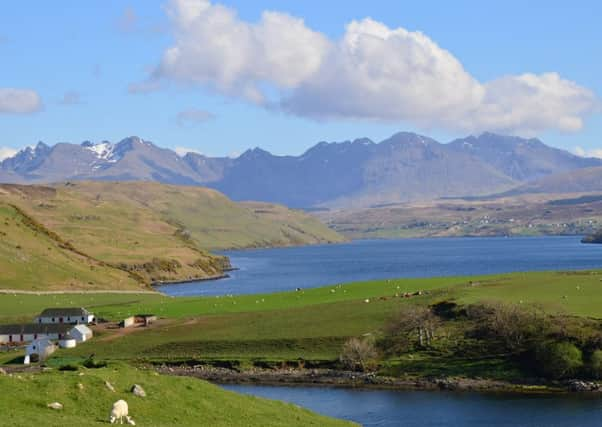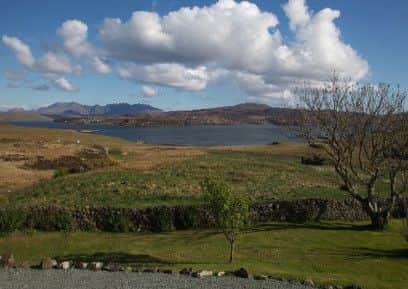A history of Scottish names (part five)


Jack
Popular male first name and surname.
As a male first name, Jack is a diminutive of John, which means ‘God is gracious’ and John was for centuries the most popular male first name in Scotland as well as the rest of the English-speaking world. In recent years Jack has become a popular male first name in its own right and now vies with Lewis as the most popular boys name for boys in Scotland.


Jack is also predominately Scottish surname. In this context it does not derive from John, but from the name Jake, a diminutive of Jacques, which is the French form of both James and Jacob and means ‘supplanter’.
Jackson
Surname meaning ‘son of Jack’
James
Advertisement
Hide AdAdvertisement
Hide Ad

Biblical male name that derives from another Biblical name, Jacob, and is thought to be ‘supplanter’. James has long been a popular name in Scotland through its royal traditions.
In the period between 1400 and 1625, six out of the seven monarchs were called James (the seventh was not called James because she was a girl).
James VI of Scotland became James I of England in 1603, so uniting the two crowns with one monarch.
After James VII of Scotland (James II of England) was deposed in 1688, supporters of James and his son (also James) and grandson (known as the Old and Young Pretender respectively) were called Jacobites (after Jacobus, the Latin form of James).
Diminutives of James include Jim, Jamesie, Jimmie and Jimmy.
Jameson, Jamieson
Predominantly Scottish surname that means ‘son of James’.
Famous Jamesons include Jameson’s Irish Whisky, which was first distilled in Dublin in 1780 by a Scotsman called John Jameson.
Jamie
Male and female first name that is the Scottish diminutive for James, but has become a very popular name in its own right.
Jardine
Scottish surname that originated in Dumfries.
The name is derived from the French word jardin meaning ‘garden’.
Jean
Advertisement
Hide AdAdvertisement
Hide AdFemale first name that was introduced to Britain from the French Jehane and is the feminine form of John.
While the name fell out of favour in England (where it was replaced by Jane), jean remained a popular first name in Scotland and became regarded as a typically Scottish name.
Jessie
Scottish female first name that was mostly used as a diminutive of Jean or Janet (both of which are feminine forms of John), but can also be a first name in its own right.
It is not clear whether Jessies were generally taller or bigger-boned than your average Scottish Mary of Margaret, but when men searched for a female name to insult a fellow who was considered weak or insufficiently masculine, it was the name Jessie that they chose to use.
Jock
Popular diminutive of the name John.
The name Jock was commonly used by non-Scots to describe all Scots - no matter what their actual name or gender may be - often in a not especially flattering manner.
John
Male first name derived from the Hebrew meaning ‘God is gracious’.
For centuries John was the most popular male first name in Scotland.
Johnston, Johnstone
Scottish surnames that sound identical but had different origins.
Advertisement
Hide AdAdvertisement
Hide AdJohnston is a Scots variation of an English surname Johnson, meaning ‘son of John’, whereas Johnstone derives from the Scots word toun and means ‘the town of John’.
Saint Johnstone is an old name for Perth that still survives in the town’s football team,
In medieval Scotland, the Johnstone clan was one of the most important clans in the Borders, boasting the somewhat unlikely nickname of ‘the Gentle Johnstones’.
Kayleigh
First female name.
The name became popular in 1985 when British rock band Marillon reached number two in the charts with a song of that name.
Almost all Kayleighs in the UK were born after 1985.
Keir
Scottish surname that is generally considered to be a variation of the surname Kerr, although there are also places called Keir in Stirling and Dumfries and Galloway.
The name Kerr either derives from Gaelic word carr meaning ‘fort’, the Gaelic word ciar meaning ‘dusky’, or the Norse and Old English word carr meaning ‘marsh’.
Keith Surname and popular boy’s first name.
The name comes from the town of Keith in Moray. The town derives its name either from the Pictish first name Cait or from the Brythonic word coit meaning ‘wood’.
Kelly
Surname and both male and female first name.
It is the most common surname in Scotland of recent Irish origin and derives from the Irish first name Ceallagh, which is of uncertain origin but possibly means ‘strife’ or ‘church’.
Kennedy
Surname and occasional male first name.
Advertisement
Hide AdAdvertisement
Hide AdThe name originated in Ireland and became established in Ayrshire in the 13th century before being taken back to Northern Ireland and around the word.
The name derives from the Gaelic ceann eidigh meaning ‘ugly head’.
Kenneth
Male first name. The name is the anglicized form of a Gaelic first name Cinaed and Pictish first name Ciniod, both meaning ‘born of fire’ and another Gaelic first name Coinnich or Coinneach meaning ‘handsome’ or ‘fair’. Three of Scotland’s earliest kings were called Kenneth including Kenneth MacAlpine who is 843 united the kingdoms of the Scots and the Picts.
Diminutives of the name include Ken or Kenny.
Kenzie
Male first name that derives from the Scottish surname MacKenzie meaning ‘son of Kenneth’.
Kerr, Carr
Scottish surname from the Borders and occasional male first name. The name either derives from the Gaelic word carr meaning ‘fort’, and the Gaelic word ciar meaning ‘dusky’ or the Norse and Old England word carr meaning ‘marsh’. The surname Carr is a variation of Kerr.
Kidd
Surname that in Scotland derives from the first name Kid.
This was a diminutive of Christopher, which comes from the Greek Khristophoros meaning ‘bearer of Christ’ and made popular by Saint Christopher, the patron saint of travellers.
Kirk Scottish male first name and surname.
The name is derived from the Scots word kirk meaning ‘church’, with the particular reference to the Presbyterian Church of Scotland.
The Scots word originally comes from the Greek kyriakon meaning ‘Lord’s house’, and was brought to Scotland through the Norse variation kirke.
Advertisement
Hide AdAdvertisement
Hide AdKirkpatrick Scottish surname that originated from two villages in Dumfries and Galloway called Kirkpatrick and means ‘church of St Patrick’.
Kirsty, Kirstie
Female first name that was orignally a diminutive of Kirsten or Kirsten.
These were Scottish and Scandinavian variations of Christine and Christina, the feminine forms of the name Christian.
Knox
Scottish surname that originated in Renfrewshire. The name is derived from the Gaelic cnoc meaning ‘hill’ or ‘hillock’. Scotland’s most famous Knox is Protestant reformer John Knox.
Kyle
Scottish surname that has recently become a popular first name.
Kyle comes from the Gaelic word caol meaning either ‘strait’ or else a ‘person who lives at the strait’.
There are several geographic Kyles in Scotland, the most famous being the Ayrshire district of Kyle and the Highland village of Kyle of Lochalsh at the mainland end of Skye Bridge.
Lachlan
Male first name that derives from the Gaelic lochlann meaning ‘land of the lochs’.
Advertisement
Hide AdAdvertisement
Hide AdThe name traditionally referred to a person who came from Norway.
Laird
Scottish surname that comes from the Scots word laird meaning ‘landowner’.
Lamont
Scottish surname that originated in Argyll.
The name is derived from the Norse log mann meaning ‘lawman’ or ‘lawgiver’.
Laurie, Lawrie
Scottish surname that derives from the diminutive forms of the male first name Laurence or Lawrence. The first name in turn derives from the Latin name Laurentius, which originally referred to inhabitants of an ancient Italian town of Laurentum and became a popular male first name after the 3rd-century Christian martyr Saint Laurence.
Law
Surname derives from the Scots word law meaning ‘hill’.
People with this surname are not, therefore, descended from lawyers or solicitors but from people who lived on a hill.
Lawson
Predominantly Scottish surname.
It may derive from the surname Law (meaning ‘dweller on the hill’) or from the male first name Lawrence (meaning ‘man from the town of Laurentum’.
Leask
Scottish surname that has become established in Shetland.
It is thought that the name originated in a place in Aberdeenshire formerly called Leask (now Pitlurg), before moving north.
It has also been suggested (although not widely accepted) that the name might be derived from the Gaelic lasgair meaning ‘brave’.
Lennox
Advertisement
Hide AdAdvertisement
Hide AdSurname that takes its name from the historic region of Lennox that would become Dunbartonshire. The name is Brythonic in origin and possibly means ‘men of the Leven’, in reference to the River Leven and the flows of Loch Lomond to Dumbarton.
Lennox would become the first powerful earldom in the 13th century and then the title of dukedom in 1581.
Leslie, Lesley
Scottish surname and both male and female first name.
The name originates from the village called Leslie in Aberdeenshire, which is derived from the Gaelic lios laith (with lios menaing ‘enclosure’ or ‘garden’ and liath meaning ‘grey’) or lios linn (with linn meaning pool).
Therefore Leslie could either be ‘grey enclosure’ or the slightly nicer ‘garden pool’.
The Leslies moved to Fife in the 13th century, and the Fife town of Leslie is named after the family.
The Leslies became known as a family of soldiers and led the armies of the Scottish Covenanters in the 17th century.
Lewis
Most Scottish Lewises are named after the Isle of Lewis.
Lewis is in fact only the northern part of the Hebridean island (with Harris being the south part), and the name probably derives from the Norse ljodhus meaning ‘homes of the people’, as Lewis was ruled for centuries by Scandinavians. Gaelic is spoken in most of the island and the Gaelic name for Lewis is Leodhais. It is often said that the Gaelic version of the name is derived from leodghuis meaning ‘marshy’.
Liddell
Surname that derives from the Liddle Water, a river in the Scottish Borders.
Lindsay
Advertisement
Hide AdAdvertisement
Hide AdSurname, male first name and female first name associated with Scotland.
The name comes from the Norman family of de Limesay, which originated in Limesay in Normandy, but came to Scotland via the region of Lindsey in the English country or Lincolnshire. Limesay means ‘island of lime-trees’.
Livingstone
Surname that is derived from the differently spelled Livingston in West Lothian (where there was a settlement long before the current new town).
The place was named either after an English landowner called Leving or a Flemish merchant called De Leving who settled there in the 12th century.
Lockhart
Scottish surname that originated in Dumfries and Galloway. The name does not, as you might expect, derive from the word ‘loch’, but instead appears to derive from a family or person called Locard, who was either Norman or Scandinavian.
The name Locard is of Germanic origin with loc meaning ‘lock’ and ard meaninig ‘hardy’ or ‘brave’.
The Locard family would also give their name to the Dumfries and Galloway town of Lockerbie.
Logan
Scottish surname and both male and female first name.
The name comes from the Gaelic word lagan meaning ‘little hollow’ and was also a place name in Ayrshire.
Lorne
Surname and male first name that comes (like Lorna) from the Argyll district of Lorne.
Lyle
Surname and male first name that is derived from the French l’isle meaning ‘the island’.